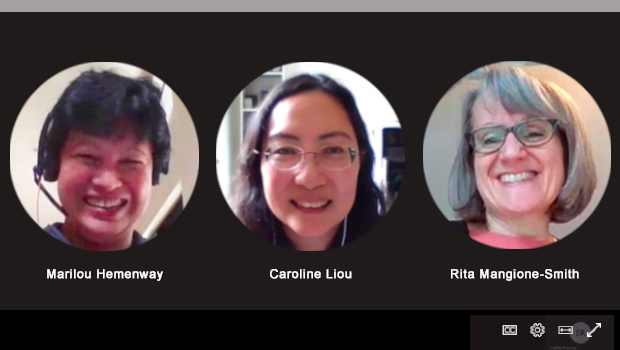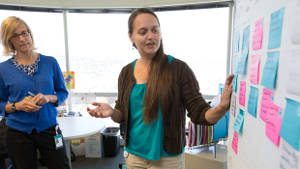Getting to know KPWHRI’s two new directors

Our Executive Director Dr. Rita Mangione-Smith (right) hosts a video call with KPWHRI's new directors of grants administration and communications.
Dr. Rita Mangione-Smith chats with Marilou Hemenway and Caroline Liou about their new roles — and the unique paths that brought them to KPWHRI
We recently welcomed two new directors to the leadership team at Kaiser Permanente Washington Health Research Institute (KPWHRI): Marilou Hemenway joined the institute in February as our director of grants administration and Caroline Liou, MA, joined in March as our director of communications.
Having one new director join the institute is exciting but having two join in a short space of time is particularly thrilling, especially when you consider the outstanding professional backgrounds and unique perspectives Marilou and Caroline bring to their new roles. Marilou comes to us with over 30 years in research administration, financial management, policy, and compliance work at Stanford University. Caroline has almost 20 years’ experience in managing communications teams and collaborating with researchers through her work with the United Nations Development Programme (UNDP) Asia-Pacific Regional Center and Regional Community Forestry Training Center (RECOFTC) — The Center for People and Forests in Bangkok, the World Wide Fund for Nature (WWF) China in Beijing, and most recently the University of Washington Department of Global Health in Seattle.
On a recent afternoon, our Executive Director Rita Mangione-Smith, MD, MPH, hosted a wide-ranging video chat with Marilou and Caroline, discussing their shared interest in health research, their reasons for joining KPWHRI — and, yes, even their current footwear. We’ve included excerpts below.
Different paths to health research
Rita Mangione-Smith: You both have had really interesting careers. What led to your interest in health research?
Caroline Liou: I had kind of a winding path here. I started my career in book publishing actually, and my dream job back then was to be a travel writer. So, I was focusing on that as my career path, and at some point I realized it really wasn’t enough. When I was living in San Francisco, I volunteered at the Asian Women’s Shelter, which is a shelter for battered women. I realized this was much more meaningful to me at the end of the day. At the same time, I was experiencing an environment that’s like an intervention, right? And that eventually led me to a wonderful job at UNDP, working on a prevention research project. And I would say that that is where my career goals started to solidify — around the power of research to prevent all kinds of health-related challenges.
Rita Mangione-Smith: That’s great. Marilou, did your work always relate to research, or did it take a circuitous path, like Caroline’s?
Marilou Hemenway: It’s actually always been related to research. My professional background is in research administration. It is a specialized skillset and it’s an integral part of research. If research administrators did not exist, the faculty would not know how to submit a proposal or all the regulations that are required. They need to focus on research, so we feel like our skillset really integrates with the researchers.
But when I was 18, I was working at a hospital. I worked directly with nurses and doctors. I saw patients who died and I said, “Oh my god, there's got to be a better way,” because you get emotional with it.
Stanford hired me in the laboratory, in research. This is where I got in. But then I wanted to go back to medicine — I wanted to see what the research does. Being involved in health research has helped me as a person, because anything that they've done in research, I see it and I get to practice it. So today I am thankful for that research because I am very healthy. And I’m so glad that I am part of the institute’s research team.
Rita Mangione-Smith: Me, too! Are there any experiences each of you have had in non-research environments that you think will be particularly useful in your new role here?
Caroline Liou: After moving on from publishing, I started working in international development, first at WWF and also at a Global South-based organization called RECOFTC. For both of those organizations, research was part of their work, but not the main part of their work. So, I guess the learning I would take from these experiences is an awareness of what research is used for and what the impact is. Being downstream from the research in these organizations and seeing ways that research has been used — is being used — to make actual changes on the ground, that’s something that will always be in my mind. What is the research going to change and how can that change come about?
Rita Mangione-Smith: How about for you, Marilou?
Marilou Hemenway: My first love is being a mom. It's a full-time job in itself. I’ve learned a lot from that — nurturing, being compassionate, giving undivided attention — and I’ve been able to do a work-life balance and have a career. And what I can bring to the institute is that, hopefully, I can make a difference and share what made me be able to have a career as well as have a work-life balance and raise kids. It can be done but you really need to focus on your priorities.
Rita Mangione-Smith: I think it's so important for our employees to have examples of people who are successfully balancing between their professional career and their life outside of their professional career. It's a learned skill. I don't think anybody is naturally born with it. I think the more that people who are successful doing that can share that experience, the more we will reach our strategic goal of having a better culture of wellbeing.
New roles, new teams to lead
Rita Mangione-Smith: As a new leader in the institute, what do you think is the most important thing you need to do to be successful?
Marilou Hemenway: Listening to your staff, listening to what they say. They have a lot of great ideas. It's exciting, getting them involved.
Caroline Liou: I'm totally with Marilou. Listening is super important. At the end of the day, you can't make change by yourself, right? It’s going to happen with everybody being valued. I'm one person and I have one perspective. You’ll never go far if you just do everything from your own perspective.
Rita Mangione-Smith: What excites you most about your new role at KPWHRI?
Marilou Hemenway: I believe in the mission of the institute. When I was looking for a job, I said this is the place I would want to be because I can make a difference.
One thing that excites me is building a grants administrative infrastructure that combines pre- and post-award. Also, our institution has a combination of central and department administration. So, there's a lot of opportunity for cross-functional collaboration. I love collaborations with different teams, from different, diverse groups.
Caroline Liou: So many things excite me. The first would be the amazing team that I'm working with. I can see that the institute understands the power of communications. It's not to say other places don't, but communications is often under-resourced. So, I have to say the communications team and their wide range of skills and experiences is a huge plus.
And, of course, the research — world-class, practical research. I feel so privileged to be here. I have noticed already that the research that's coming out of here has an immediate use, and the idea of it already impacting KP's members and hospitals is just amazing to me.
Rita Mangione-Smith: Yes, I often think of this place as the home of the impatient researcher who doesn't want it to take 10 years to get from the study to the bedside or to the patients in the community. That's what I love about it. It’s really wanting to speed that cycle up between the actual evidence production and evidence implementation and helping to make people's lives better.
Formative experiences, final thoughts … and footwear
Rita Mangione-Smith: What's one thing that might surprise people about you?
Marilou Hemenway: I came from a very, very big family. I have 15 brothers and sisters; I’m the 13th. I came here from the Philippines when I was 13, and my mother brought 10 kids by herself on the plane. Visas for everybody! My parents raised 16 kids and everybody is professional — doctors, a dentist, engineers, and accountants.
I learned about diversity at a young age. I learned to be compassionate because of also living in a household full of relatives. Even though I have so many brothers and sisters, my mother welcomed all my cousins. We accommodate everybody. One thing about my family, it's a rainbow color, especially when we get together at family reunions. We are open-minded and we are very accepting.
Rita Mangione-Smith: That's great. Caroline?
Caroline Liou: My dad was a research scientist, in chemical engineering. So, for his job we moved around a lot growing up. People sometimes ask me, “Where is your home? What do you consider your hometown?” And it's Baton Rouge, Louisiana. Some people feel surprised that — having lived in different places — this is where I consider my hometown. It is a place that shaped a lot of who I am and how I see the world.
Rita Mangione-Smith: That's really interesting. Talk more about that.
Caroline Liou: My parents are first-generation immigrants to the U.S from Taiwan and the Philippines. I was born in the U.S. but spent my younger years in Europe — in Holland — and then moved to Baton Rouge. That's where I spent my high school and college undergrad years — those are extremely formative years. Baton Rouge is considered the Deep South and, as in other parts of the U.S., race is a big deal there. There is a lot of racial division, and the way that some people saw the world was so strong — and it was very different to how I saw the world. Having grown up there, this is something that just continues on and has influenced my life.
Rita Mangione-Smith: Anything else either of you would like to share?
Caroline Liou: I'm just so happy to be here. It’s such a pivotal moment in the world, with COVID-19 and the pandemic. But COVID is not the only thing that the institute is working on. I'm happy to be working in a place that is keeping sight of many health issues that are impacting people, especially equity and health disparities.
Marilou Hemenway: I second the motion and I’m just so glad I'm here. I love Washington. Even when I go to the grocery store, everybody is so nice. It's a different culture here in Washington. I love it.
Rita Mangione-Smith: I agree. Having come here from Los Angeles, it's really different. I like the fact that I don't have to worry about what I'm wearing everyday anymore. That’s a much bigger deal in Los Angeles.
Caroline Liou: Yes, I picked up the Birkenstocks with socks very quickly.
Rita Mangione-Smith: I'm wearing fuzzy slippers right now. Don't tell anyone.
Research communications

Expert communicators help us get the word out
Our skilled communications team supports research from proposal development to study recruitment to dissemination of results.


